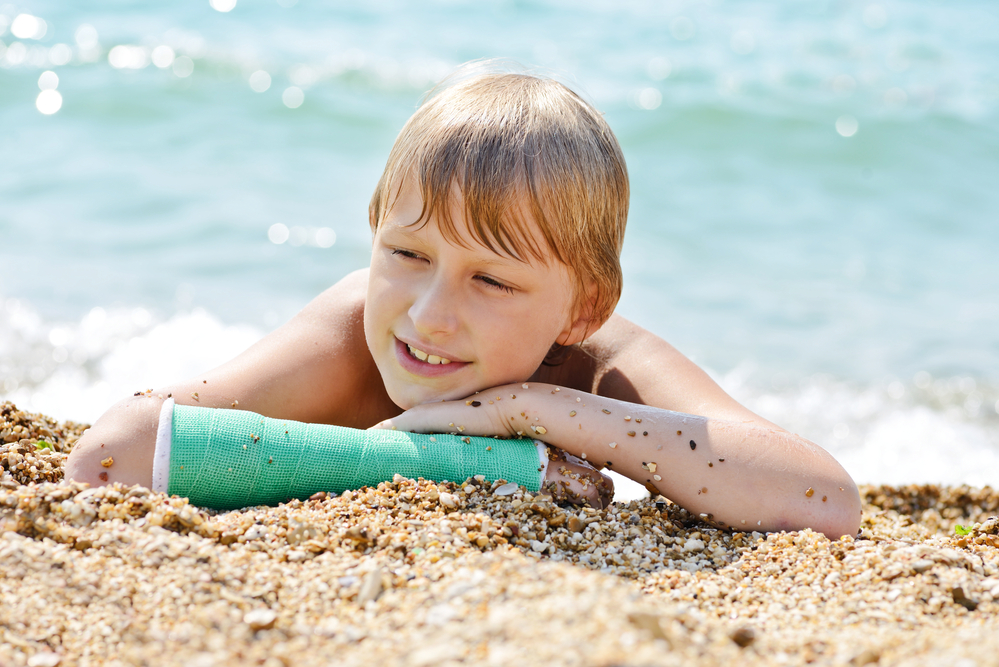Tips for Caring for Your Cast during the Summer
 Summer is here, and temperatures are climbing. Unfortunately, many types of injuries tend to become a lot more frequent at this time of year too, including broken bones. If you (or your kid) are unfortunate enough to be in a cast at this time of year, you might be uncertain of the best way to care for your cast and the injured limb while still enjoying all that summer has to offer. This article will give you a few tips on properly caring for the cast throughout summer’s many activities to help avoid potential complications while still enjoying this time of year.
Summer is here, and temperatures are climbing. Unfortunately, many types of injuries tend to become a lot more frequent at this time of year too, including broken bones. If you (or your kid) are unfortunate enough to be in a cast at this time of year, you might be uncertain of the best way to care for your cast and the injured limb while still enjoying all that summer has to offer. This article will give you a few tips on properly caring for the cast throughout summer’s many activities to help avoid potential complications while still enjoying this time of year.
Keeping Your Cast Dry
One of the most basic—and most important—steps in caring for a cast is keeping it dry. While we all know this, it can be tough to resist the call of the swimming pool on a hot summer day, especially for a kid who just wants to swim with their friends. It’s extremely important that you do all you can to keep that cast dry through any water-based activities, including showering.
If you know that you’re going to be around water, take steps to protect the cast. There are a few options available for you to do this:
- Cling wrap – The “Press ‘n Seal” variety has an adhesive that helps prevent any fluids from seeping beneath it. This will help protect the cast from any splashing, rain, or spray.
- Cast guards – You can also find pre-fit cast guards that are designed to stretch over a cast and fit snugly around it. These are obviously going to be a little more expensive than simple cling wrap, but they’re more reliable and easier to use. We carry cast protectors at many of our store locations, so feel free to reach out or stop by if you’d like to purchase one of these for your cast.
- Vet gloves – Veterinarians use long plastic gloves that cover the entire length of the arm while the do internal exams on large animals. These are a good option for covering your cast while showering or washing dishes. However, they obviously won’t keep out any water entering the glove from the opening at the top.
Regardless of which type of covering you use, please be aware that these protective measures are only intended to protect the cast from the occasional splash or gentle spray. The cast should never be fully submerged, even when wearing a cast protector. However, the can allow you or your child to sit in the shallows with the cast above water and cool off, without worrying about an errant splash wetting the cast.
You can also talk to your doctor about getting a fiberglass cast with a water-resistant liner so that you don’t have to worry about this problem quite so much.
Dealing with Sweat
Sweat is always an issue for those who have a cast, but obviously, it’s a much more prevalent problem if you’re stuck with a cast during the hottest part of the summer. You want to do your best to prevent sweating inside of your cast, but you also want to participate in those fun outdoor activities everyone else is doing.
If you’re going to be participating in any physical activities that might work up a sweat, be diligent about you hygiene. Ask your doctor about using a moisture-absorbing powder, such as Gold Bond, around the cast. Keep a clean, dry towel with you, and periodically wipe the skin around your cast to keep sweat from rolling down into it. When you’re done, change out of sweaty clothes and cool down as quickly as possible.
Covering It While Cooking and Eating
While most people who wear a cast know that it needs to be covered around water, they don’t give much thought to covering it around food. But food splatters while cooking or eating can leave sticky residues or stains on your cast and even cause it to stink. If crumbs make their way inside the cast, this can also lead to bad odors and even increase the risk of an infection. And, because you can’t get a cast wet, there’s really no good way to clean it off if it gets dirty.
So, if you’re going to be attending an outdoor barbecue, slip a protective cover over that cast before manning the grill or grabbing that slice of watermelon. While it might feel a little inconvenient in the moment, it’s a lot better than dealing with a sticky or crumb-filled cast for days or weeks after.
Proper cast care is essential to your recovery. So, follow these tips to keep your cast clean and dry while you continue to enjoy the usual summer fun. And if you need any cast protectors, stop by one of our many Medical Xpress locations or Arlington Medical Supply to pick some up!